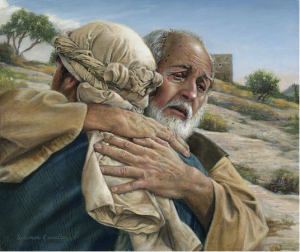 One of the reasons Jesus came was to reveal God to us.
One of the reasons Jesus came was to reveal God to us.
Among all the truths that Jesus revealed to us about God, one of the most critical truths in connection to the violence of God in the Old Testament is that God is not angry.
The violence of God in the Bible makes it appear that God is angry with us, and one way He deals with His anger is by slaughtering people through flood, earthquakes, pestilences, diseases, and enemy armies.
God is Not Angry with the World
When people believe that God is angry with the world, and is actively punishing us for the sins we have committed by sending us diseases, famines, earthquakes, storms, terror, and death, we malign the character of God. God does not torture, rape, kill, and murder in order to teach us to love and obey Him. While there is indeed blood on God’s hands, this blood is His own. God does not force us to bleed for Him so that we might learn some sort of lesson about obedience.
[God does not bring] about suffering in order to discipline a person. …This presumption morphs to cruel absurdity when we are speaking of horrors like a man mourning his murdered wife or a mother grieving over her stillborn child.
This way of thinking takes the cruel arbitrariness of life and deifies it by projecting it onto God. When this is done, the beautiful clarity of God’s loving will revealed in Christ and centered on the cross is obscured by a nonbiblical picture of a God of power. And Jesus’ simple words “If you see me, you see the Father” are qualified by every terror-stricken scream of torture throughout history (Greg Boyd, Is God to Blame? 82).
But God is not angry.
God is not out for bloody revenge.
God does not punish, kill, torture, or maim so that by some inscrutable aspect of His mysterious will, He might teach us a lesson.
Quite to the contrary, as I reveal in my book, (#AmazonAdLink) The Atonement of God, God’s nature and character is revealed in Jesus Christ.

How Jesus Reveals God is Not Angry
When Jesus began to minister in Galilee, one of the common threads of His miracles and message was that God is not angry at us. Instead, God loves us, and wants to redeem, deliver, and rescue us from the clutches of Satan, the bondage of sin, and the sting of death.
I wish we had space and time to go miracle by miracle and parable by parable through the Gospel accounts to see how Jesus reveals the love and forgiveness of God through everything He says and does.
Such a study would reveal that the consistent message of Jesus is not that God is angry with us and has departed from us, but that we have misunderstood God and have departed from Him, and now, finally, God is bridging that divide by drawing near to us and reconciling us to Himself once and for all in the person and work of Jesus Christ.

The Parable of the Prodigal Son Reveals that God is Not Angry
Take one of the more popular parables as an example: the parable of the Prodigal Son. We all know the story. A man has two sons. The younger asks for his portion of the inheritance, and when he has received it, travels to a far country where he squanders his inheritance on parties. He eventually finds himself living and eating with the swine, and so decided to return home to his father, in the hopes that he might be taken on as a servant. But when he is a long way off, the father sees him coming and runs to him. Then the father throws a party for his long-lost son, which leads to a teachable moment for the older son.
There are multiple levels of interpretation to this parable, but one is sufficient for our purposes here.
The prodigal son is not just a story about a wayward Christian, but is a story of cosmic proportions. It is about a father who loved his son so much, he let the son think the worst of him, insult him, slap in the face, treat him as if he were dead, and then on top of it all, depart into a foreign land. Note that the father goes nowhere. The son has done all the leaving while the father stays right where he was.
 When the son returns, the father has clearly been watching for his return, for when the son is still a long way off, the father sees him coming, and runs to meet him on the road. For a wealthy middle-eastern man, any sort of running was considered shameful, but to run to meet a son who had betrayed you was extremely shameful. Nevertheless, due to the father’s great love for his son, he runs to meet him, and not only that, but gives him a warm welcome and throws a party for him.
When the son returns, the father has clearly been watching for his return, for when the son is still a long way off, the father sees him coming, and runs to meet him on the road. For a wealthy middle-eastern man, any sort of running was considered shameful, but to run to meet a son who had betrayed you was extremely shameful. Nevertheless, due to the father’s great love for his son, he runs to meet him, and not only that, but gives him a warm welcome and throws a party for him.
The only thing that is really different about this parable and how God behaves toward prodigal humanity is that God came Himself into the far country to seek and save the lost. Then, when God found His lost child, the child killed Him.
But other parables represent this aspect of what God has done for humanity in Jesus Christ. The point of this parable, as well as many of the other parables by Jesus, is to show humanity how badly we have misunderstood God and what God is doing in this world, and that God is not out to destroy us, slaughter us, or punish us, but is seeking to bring us back into His family, to rescue us from the pigsty we find ourselves living in, and to throw us a party when we are reconciled to Him.
This sort of message is found, not just in the parables of Jesus, but in all the other teachings and miracles of Jesus as well. By the love of God, those who were once far off have been brought near and have been accepted once again into God’s family.
God is Not Angry; God is Love
God is not angry with us; He loves us! And since the first sin of Adam, God has been doing everything He can to rescue and deliver us from sin, death, and devil.
The violent portrayals of God in the Bible are actually part of this rescue operation of God. He is not the one commanding or performing these violent actions, but is instead, taking the blame for them. Just like the father of the prodigal son, out of His great love for us, God is shaming Himself for our sake.
 How can a God who says "Love your enemies" (Matthew 5:44) be the same God who instructs His people in the Old Testament to kill their enemies?
How can a God who says "Love your enemies" (Matthew 5:44) be the same God who instructs His people in the Old Testament to kill their enemies?
These are the sorts of questions we discuss and (try to) answer in my online discipleship group. Members of the group can also take ALL of my online courses (Valued at over $1000) at no charge. Learn more here: Join the RedeemingGod.com Discipleship Group I can't wait to hear what you have to say, and how we can help you better understand God and learn to live like Him in this world!




Great blog, Jeremy. It baffles the mind that christians don’t get this, or worse yet, that they want to argue that God”s natural disposition toward us is anger. What a sad state of affairs we’re in.
Yes. Why is the default position for God “anger”? Imagine the difference it would make in our life and theology if we began to view God’s default position as love!
Jeremy, I see a reaction to the idea of a perpetually enraged deity, standing on a cloud just waiting to throw a lightening bolt at an offender. I’m with you there. I think though, that you may be over-correcting. I haven’t read everything you’ve written so far, so I don’t know, but it feels like you are attacking a straw-god.
How do you characterize Jesus’ attitude toward those who were desecrating the temple? Or God’s feelings toward golden-calf worshippers, or those who bowed the knee to Baal, or…. ? That God expresses an intense displeasure toward those who mock him seems to have a pretty sizable testimony in the Scriptures.
That doesn’t mean that God acts like me when I go teetering over the edge and my kids are running me in circles, but there is some sort of anger that God displays.
You’ve expressed your root question as ‘How can a God who says “Love your enemies” (Matthew 5:44) be the same God who instructs His people in the Old Testament to kill their enemies?’ How about in this scenario:
You are hiking in the woods when you hear whimpering and protests. Concerned, you quickly and quietly veer off the trail toward the sound, and after pressing through some brush you come upon an man attempting to molest a young girl. What is the godly and loving response to this situation? If you fail to see God’s protective hand over the people (and particularly the faith-filled remnant of the people) through which the Messiah would come forth, you will fail to see a right application of protective violence. What do you think?
Dan,
Yes, this is a small part of a MUCH longer series on the violence of God in the Bible. Without the rest of that context, this post probably does seem like a bit of an over-correction.
In the scenario you present, I would probably attack the man and try to kill him. I would probably end up in prison as a result. Would my murder be sin? Probably. So does this mean that God can do the same without sinning? I don’t know.
You have actually asked THE hardest question regarding the violence of God. I think that if we do not have an adequate answer to the scenario you pose, we are just wasting our time trying to discuss the violence of God.
The thing is, though, is that IF God CAN kill the man without it being sin on His part, why doesn’t He?
Thank you for your response Jeremy, and my apologies for my impatience.
I don’t think that causing the death of a child molester in the process of stopping him (though death may be more than is required to effectively love the child by protecting her from the assault) would be sin. I’m open to being wrong about that, but I think the worse sin would be to fail to act in some way. It’s not loving to either the man or the girl to allow the event to continue.
Which might highlight a difference between God and his creation. I think that in the scenario above I would be in sin if I didn’t act (which action might be to call out and cause the man to flee, or to whack him on the back of the head with a stick, or to jump on him and restrain him, or… There are many possibilities there…). If I extend that logic in God’s direction, I have to conclude that God is guilty of that type of sin times multiple billions.
I don’t think God is guilty of the sin of failing to prevent humans from committing evil against each other. I think God is fully in the right in whatever he chooses to do with his creation, in the same way that a painter is in the right if he tosses the canvas on the fire (though someone else would be in the wrong if they did the same with his painting). God’s love is not in conflict with his rights. So, could God kill the guy? Yep, though that’s not his goal or heart.
So, why doesn’t God step in to prevent human suffering? A few things come to mind: it’s temporal, over against the promise of eternal life; it serves a purpose in personal sanctification and in the larger scheme – the big story that God is orchestrating; and, it’s part of the fallen creation and points us to the missing wholeness and beauty we know is lacking in our experience.
You are trying to find a consistency between your picture of Jesus and your picture of the OT God. I question whether you have a clear picture of either. God is not an easily-peeved lightening-bolt thrower. Jesus is not a milk-toast give-everyone-a-pass kind of guy. I don’t think you have to re-write the OT to get God off the hook…
I guess this would be the place where I need to fire up my own blog to get a more comprehensive dialogue going. I’m not against you; I’m interested to see where your thinking goes as we all seek what is True. I’d love to sit down and talk it over, if there’s ever an opportunity.
Grace to you as you continue pursuing a clearer understanding of our Father.
Thanks. You could very well be right. I know that my picture of God and Jesus are both incomplete. How could it be otherwise? No one can fully understand God.
I am not trying to rewrite the OT, and I don’t think I have presented Jesus as a milk-toast kind of guy. I believe the route He chose takes the greatest possible human strength and courage.
Would love it if you fired your blog back up and wrote some response to this or just your own perspective!
Hey Jeremy. Are you still interacting with comments? I see you are generating a lot of content – lots of thoughts to get out there – but I wonder whether there is value in trying to interact with what you are putting forth? For example, do you see any appropriate use of violence (by, or endorsed by, God), or is violence opposite of the nature of God in every circumstance? Do you have a post that addresses this question, and/or the scenario in my comment above?
Dan,
Yes, I am still responding to comments. But due to how busy I am, I am only able to get to comments about once or twice a week. It often takes me several hours to respond to comments, so I am not sure how much longer I can even keep that up…
I briefly addressed the scenario above, but to answer your question in this comment, I think God does discipline, which sometimes involves violence, but maybe not violence that kills. I think the death is the opposite of life, and God is for life, even in the most reprehensible of people. There are, of course, elements of God’s creation which He created that lead to death when people behave a certain way, but this is different than saying that God kills. As I write this, I know it is not a good answer or well phrased. I apologize for that. It would be so nice to sit and talk about this topic at great length.
you must be a cathoholic!!! GOD is not angry with us??? You had better read the Bible instead of attempting to interpret thus misconstrue GODS’ Word. Yes, GOD is very angry with us [humanity]!
He is also angry regarding your false message Jeremy.
Disease is one way that God gets our attention. The prodigal son is a story of a young man who leaves his father, wastes his inheritance, and then repents and comes back to be received by a loving father. God wants repentance that turns us from judgment to his loving arms of mercy. God was going to destroy the city of Ninevah but they repented from Jonah’s preaching, so God did not destroy the city.
2Chronicles 7:13-14 13 “When I shut up the heavens so that there is no rain, or command locusts to devour the land or send a plague among my people, 14 if my people, who are called by my name, will humble themselves and pray and seek my face and turn from their wicked ways, then I will hear from heaven, and I will forgive their sin and will heal their land.
I believe God is looking for national repentance and for people to accept his love. Whom the Lord loves, he chastens. Chastisement is not punishment but correction and is the product of God’s love.